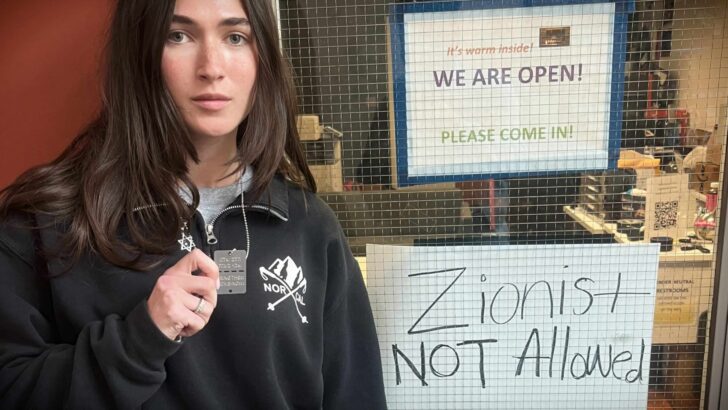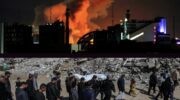The film ‘October 8’ advances a mindset that suggests Jews can only be victims, and never aggressors, and offers a distorted framing of antisemitism.
by Nora Berman, reposted from The Forward [related articles added by IAK]
I had the choice of three different nearby theaters at which to see October 8, a new documentary about the proliferation of American campus antisemitism after the Hamas terror attacks. Which is why it was surprising to see filmmaker Wendy Sachs recounting the travails of getting the film released in a recent interview.
She described being shunned by NBC and CNN, with agents running for the hills. “No distributor would touch this film,” she told The Hollywood Reporter. “That feels like bias.”
Except… a distributor did end up taking the film. Briarcliff Entertainment opened it in 100 theaters nationwide this week, and it grossed more than $300,000 in its first five days.
I was confused. And reminded of another recent documentary, No Other Land. A film about Palestinian displacement and expulsion in the West Bank, No Other Land was co-directed by Israelis and Palestinians, and, despite winning an Oscar earlier this month, still doesn’t have a United States distributor. Seeing that film in early February required that I frantically book a ticket for one of the few showings at an independent theater, which was only screening it for three days, before it sold out.
The cognitive dissonance inherent in Sachs’ statement — a suggestion that the gates are closed to Jews, when the evidence suggests they are, in fact, fairly open — was in line, for me, with the consistent fear provoked by the film itself. The only victims that October 8 — the first mainstream accounting of the post-Oct. 7 aftermath in the U.S. — acknowledges are Israeli and American Jews.
Their enemies are anti-Zionist college students, supposedly whipped into a frenzy of antisemitic hatred by Islamic terror groups working to destabilize the U.S. from within. And by weaponizing Jewish fear so intensely, October 8 provides an important window into a certain calcification of Jewish identity since Israel’s founding.
If an alien visited planet Earth and was shown October 8, they would think that after the horrific events of Oct. 7, thousands of people took to the streets in protest of Israel solely out of hatred for Israel and Jews, and not because Israel’s ensuing offensive in Gaza quickly claimed the lives of thousands of Palestinians. (The Gaza Health Ministry, which does not distinguish between civilians and combatants, estimates that close to 50,000 Palestinians have been killed in the war, including an estimated 13,000 minors under 18.)
I wouldn’t be able to fault the extraterrestrial’s logic, however, as the war in Gaza is almost entirely absent from the film. Israel’s bombardment of the Gaza Strip is alluded to only twice: Once, 50 minutes in, in an examination of what the film believes to be The New York Times’ flawed coverage of the Al-Ahli Arab hospital bombing in November 2023, and again in the closing minutes of the film, when an MIT student says that she is saddened by “innocents dying in Gaza.”
Sachs herself seems to think that critiques of the war’s absence from her film are an example of media bias towards Israel. In her Hollywood Reporter interview, she mocked a Washington Post review of her film by paraphrasing its argument: “‘Really good film except it doesn’t go into the government and how oppressive and horrible they are in murdering Palestinians.’” Her point: It’s a little annoying to criticize a movie for not having an entirely different subject.
To a degree, her frustration is understandable. Her film is focused not on Israel’s military operation in Gaza, but on the American reaction to the events of Oct. 7, and no one documentary can ever possibly tell the whole story.
But omitting some real consideration of the last year and a half of Israel’s war, particularly from a film that is almost entirely focuses on college students’ reaction to the war, is a move that’s not about directorial discretion. It’s about offering an interpretation of power that is missing key considerations.
Sachs’ film advances a mindset that suggests Jews can only be victims, and never aggressors. In October 8, Israel is a beleaguered nation beset by enemies, instead of a regional superpower with overwhelming financial and political support from the U.S. It’s the socialist dream of Israel, and not the increasingly authoritarian real Israel under Prime Minister Benjamin Netanyahu.
But that’s not accurate. Israel does have power, and how it uses that power has an effect on the world. That fact doesn’t make the instances of antisemitism Sachs chronicles less antisemitic, or somehow acceptable because Israel is bombing Gaza. It does mean that her framing of that antisemitism as yet another arm of an entrenched global campaign against Jews is, in an essential way, deeply distorted.
Oct. 7 unleashed very real trauma for Israeli and American Jews, and some very real antisemitism followed. October 8 shows a Columbia student activist proclaiming that “Zionists don’t deserve to live;” that’s unquestionably antisemitic. So is the harassment of Jewish college students and their exclusion from campus spaces, and protestors chanting in support of Hamas.
But narrowing the experience of being Jewish after Oct. 7 to one of flat victimhood doesn’t help, particularly at a time when the threat of antisemitism is being used as a cudgel by the Trump administration to interfere in education and immigration policy.
The violence in the Middle East has unleashed a torrent of toxic rhetoric against both Jews and Palestinians. Yet it will be impossible to learn and heal from this moment when a film like October 8 stokes the flames of an age-old fear, in the process making it only more difficult to soberly examine and learn from the world as it actually is.
Nora Berman is the Forward’s deputy opinion editor.
ADDITIONAL RELATED READING:
-
- The Oscar-winner Israel partisans blocked Americans from seeing
- Media Obscure Message of Oscar-Winning Documentary No Other Land
- Israel still can’t find any 7 October rape victims, prosecutor admits
- How Israel killed hundreds of its own people on October 7
- Israel has manufactured an industrial-scale version of Jim Crow rape hoaxes
- Israel’s leading paper says its own army deliberately killed Israelis on October 7
- WATCH: How an Israeli colonel invented the burned babies lie to justify genocide
- American Media Keep Citing Zaka — though its October 7 atrocity stories are discredited in Israel
- The Case Against Mahmoud Khalil: How The Israel Lobby Fueled a Campus Crackdown




